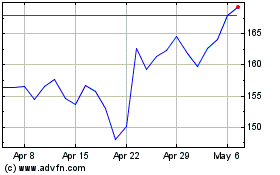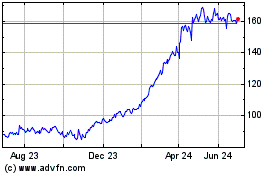GE Bullish on Data for Big Industry
June 23 2016 - 6:40PM
Dow Jones News
General Electric Co. will plow $1.4 billion into its
fast-growing software business this year, as the maker of jet
engines and power plants races to dominate the market for digital
tools to control major industrial operations.
The company said the investment will help drive rapid growth in
revenue for its California-based GE Digital business, which it
forecasts will reach $15 billion in 2020, more than double the $6
billion-plus it is expected to bring in this year.
"We're in a horse race," GE Digital Chief Executive Bill Ruh
said in an interview, as competitors in Silicon Valley and other
industrial manufacturers try to develop similar software that can
fine-tune the operation of heavy machinery and avoid unplanned
downtime.
GE began its push into software and digital offerings in 2011
when it opened offices near Silicon Valley and began hiring
hundreds of software engineers. The drive is a central piece of
Chief Executive Jeff Immelt's strategy to refocus on its industrial
roots of power generation, jet engines and medical equipment, after
shrinking its finance operation.
Mr. Immelt now refers to GE as "the digital industrial" company,
and the company said its software efforts are helping to streamline
its own manufacturing and design processes. GE itself will reap $1
billion in added productivity from its operations as more factory
and design processes are fed into digital systems that improve
collaboration and speed up production cycles.
But the business case is to sell the products to its industrial
customers--like airlines, power utilities and hospitals -- that are
struggling to wring greater productivity out of heavy machinery in
a time of slow global economic growth.
For the aviation business, that means providing owners of GE jet
engines with new predictive models that will show when parts are
more likely to need replacement based on the environment in which
the engines fly. In its power business, GE helped Qatar-based
natural gas producer RasGas Company Ltd. reduce downtime on its
mile-long liquefied natural gas production trains, avoiding one-day
outages that can cost $150 million, the company said.
Its digital business is still small compared to sales of its jet
engines, power turbines, locomotives and medical scanners. GE's
industrial operations had revenue of $108.8 billion in 2015. It has
added 5,500 new developers in the past few years and plans to add
2,000 more by year-end. Its total digital workforce is around
28,000 globally, a fraction of its 333,000 total employees.
GE is betting that there is more money to be made from
connecting and harvesting the data of heavy industrial machines
like jet engines than in other areas of the so-called "internet of
things," like wifi-enabled thermostats and stereos.
"We don't think the money is in connecting thermostats," Mr. Ruh
said. "There may be money at the home but nobody knows."
Write to Ted Mann at ted.mann@wsj.com
(END) Dow Jones Newswires
June 23, 2016 18:25 ET (22:25 GMT)
Copyright (c) 2016 Dow Jones & Company, Inc.
GE Aerospace (NYSE:GE)
Historical Stock Chart
From Mar 2024 to Apr 2024

GE Aerospace (NYSE:GE)
Historical Stock Chart
From Apr 2023 to Apr 2024
